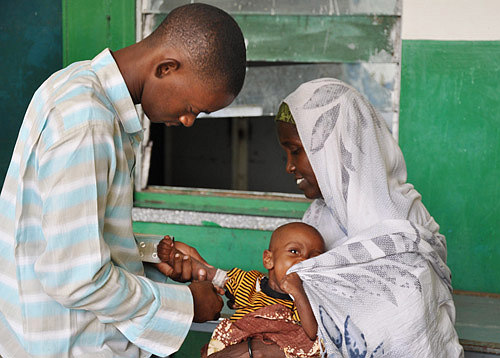|
 |
|
HEALTH MATTERS: A nurse treats a boy in a Mogadishu hospital on July 27. Maternal care in Somalia and many other African nations remains poor (XINHUA) |
Although the world economy is showing signs of recovery, many developing countries are still dealing with economic difficulties brought on by the financial crisis. As a result, global poverty reduction is facing major challenges, and promoting the development of these countries has become a pressing issue, wrote Yang Jiemian, President of the Shanghai Institutes for International Studies, in a recent article in People's Daily. Edited excerpts follow:

Although the global economy is recovering from the financial crisis, the degree of the recovery is uncertain, as the foundation of the recovery remains fragile and is not proceeding uniformly around the world.
The situation is worse in developing countries. On one hand, their source of capital is dramatically reduced. In developing countries, the foreign direct investment (FDI), as a percentage of GDP, is projected to drop from 3.9 percent in 2007 to 2.8-3 percent. And in sub-Saharan African, East European, Central Asian and Latin American countries, where the FDI accounts for as much as 20 percent of total investment, the impacts of the financial crisis are particularly severe.
On the other hand, their exports are facing a big challenge, given plummeting demands in major markets. In 2009, total exports of developing countries dropped 22 percent, according to WTO statistics. And the World Bank said that in 2009, although the GDP of developing countries had a positive growth rate, that growth rate dropped to 1.2 percent, much lower than the potential rate of 3 percent. In African countries, the economic growth rate dropped to 2.5 percent from 6 percent from 2006-08. The GDP of countries in Central and Eastern Europe and Central Asia, which were hardest hit by the crisis, decreased an estimated 6.2 percent.
The financial crisis makes reducing global poverty difficult, and it has become tougher to achieve the UN Millennium Development Goals. In 2009, the global market demand for products from the 43 least developed countries dropped 5-10 percent, according to the World Bank. Overseas remittances could fall 5-7 percent. In many tourism-dependent countries, tourism revenues decreased 8 percent.
In 2009, 30,000 to 50,000 additional children may have died of malnutrition in Africa, and 1 billion people around the globe were considered to be in chronic hunger. By the end of 2010, 64 million more people will fall into extreme poverty due to the financial crisis. The development problem has become a top concern for the international community.
Addressing imbalances
Without the economic growth of developing countries, the world economy cannot realize strong, sustainable and balanced growth.
The development of these countries serves as a catalyst for strong growth in the world economy. Prior to the financial crisis, China, India, Brazil and other emerging economies maintained continuous and high-speed growth. Their contributions to world economic growth demonstrated their global significance.
The status of developing countries continues to rise in the world economy. Whether their individual economies can enjoy rapid growth will determine the future direction of the world economy. According to the Organization for Economic Cooperation and Development (OECD), based on purchasing power parity, the total GDP of non-OECD countries accounted for 40 percent of the world's total in 2009. It is projected to be 49 percent in 2009 and 57 percent in 2015.
In addition, strengthening economic and trade relationships among developing countries will present opportunities for robust world economic growth. From 1990 to 2008, the world's trade volume increased four times. But the trade volume among developing countries increased 20 times, showing the potential of South-South cooperation. With increasing openness among developing countries, South-South cooperation will become a new driving force for world economic growth.
The rise of developing countries would also help to mitigate the risks associated with relying solely on developed countries to propel world economic growth. This would ensure the sustainable development of the world economy.
| 